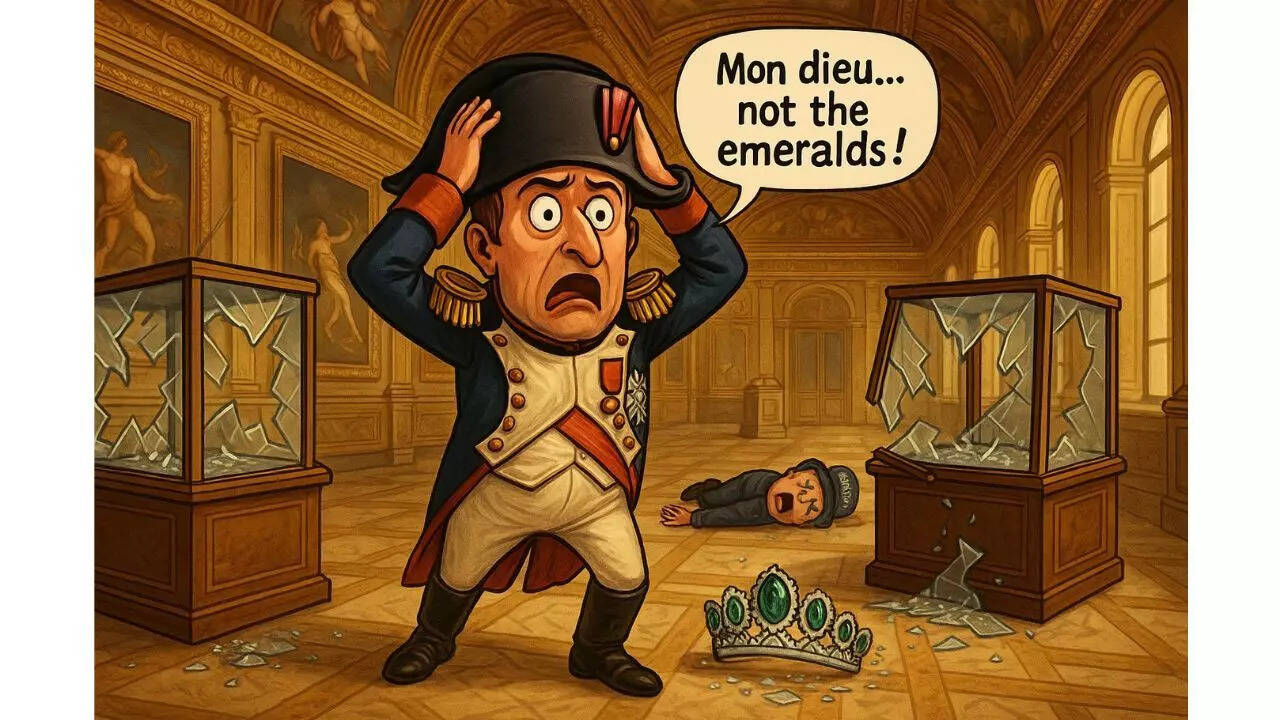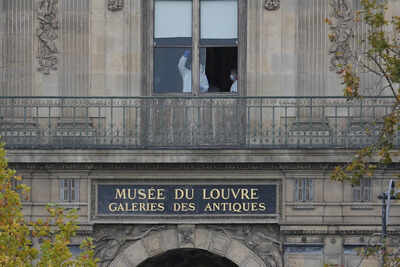It was the kind of crime that feels written by a screenwriter who chain-smokes Gauloises and listens to Serge Gainsbourg. Four masked men, a crane, and the Louvre. Not to steal the Mona Lisa, not to deface liberty or art, but to nick Napoleon’s bling. The crown jewels of France — a tiara here, a diamond-studded heirloom there — vanished under the noses of the world’s most sophisticated museum guards. A week later, two suspects from the banlieues were caught near Paris, one allegedly moments from flying to Algeria. The prosecutor fumed at the press for leaking the arrests. The jewels, of course, remain missing. The French call it an affaire, but it was more like a national farce dressed in gold leaf.
Napoleon’s Ghost Loses His Head

France, that eternal theatre of grandeur and collapse, suddenly found itself watching a scene that could have been staged by Camus himself — the absurdity of a nation chasing the ghost of its own empire. The Louvre wasn’t just robbed; its historical vanity was. Among the stolen pieces were the ornaments of Marie-Amélie and Hortense, reminders of a time when France measured glory in carats and colonies. And then there was Empress Eugénie’s crown, dropped on the pavement during the escape like a forgotten prop in a play too hurried to be real. In an odd twist of poetic justice, the thieves managed to damage what Napoleon III’s wife once wore — as if history itself rejected the idea of returning to monarchy, even in theft. The crown survived, battered but intact, like France’s self-image after Brexit, Macron, and now, this.
A German Lift Ascends to Memehood
And then came the lift. The Böcker AgiLo 400, a German engineering marvel meant for furniture removal, was unwittingly dragged into art history. It was the crane the thieves used to scale the Louvre’s facade. In the social-media age, even hardware gets its fifteen minutes of fame. Böcker, the small-town manufacturer, responded with perfect Teutonic humour: “If you’re in a hurry,” their viral ad read, alongside a photo of the same model parked by the Louvre. “Quiet as a whisper. Fast as an artist’s regret.” France might have been humiliated, but Germany was trending. In another century, the French might have written angry pamphlets about Prussian efficiency. In this one, they double-tapped the meme. The lift became a stand-in for everything absurd about the story — the perfect metaphor for modern Europe, where a piece of machinery shows more initiative than the Ministry of Culture.
The Detective Who Wasn’t There
And then came the photograph. A man in a three-piece suit, fedora tilted just right, walking past the Louvre cordon as police milled about. Thibault Camus, the photographer (yes, Camus), captured him mid-stride, cigarette in hand, as if strolling out of a Jean-Pierre Melville noir. Within hours, the image went viral. Twitter declared him Inspector Louvre. TikTok begged for a seven-part miniseries. France, once again, was saved — not by justice, but by aesthetic. The man wasn’t a detective at all. Just an elegantly dressed bystander who became the accidental face of the investigation. Yet in that absurd snapshot, he embodied the French ideal: grace amid incompetence, tragedy performed with a wink. The prosecutor had her suspects; the internet had its hero. One got the headlines, the other got immortality.
A Comedy of Crowns
The Louvre has survived revolutions, floods, and millions of tourists with selfie sticks. What it couldn’t survive was its own absurd security manual. The robbers didn’t rappel down like in Mission: Impossible; they literally parked a truck, raised a lift, smashed a window, and left. Somewhere, Kafka’s Castle must have sighed in recognition. The museum shut for days, the ministers convened emergency meetings, and Paris went through its favourite ritual: public embarrassment wrapped in intellectual reflection. “How could this happen?” they asked, as if the answer weren’t obvious. It’s France. The same country where striking train workers apologise with poetry, and a national scandal can double as avant-garde performance art. Meanwhile, the German lift company sold out of rentals.
The Absurd Triumph
The arrests brought little closure. Two men in custody, one almost airborne, a prosecutor quoting procedure like scripture, and still no trace of the jewels. Perhaps they’ve been melted, perhaps they sit in a basement somewhere in Aubervilliers, glimmering faintly beneath a flickering bulb. But the real treasure was the absurd theatre of it all: a crime that felt more like satire than tragedy. The Louvre, once a fortress of monarchy, then of art, has become a stage where modernity mocks itself. A German lift as accomplice. A crown dropped like a bad metaphor. A bystander dressed as a detective. A prosecutor lecturing about leaks while France trends for memes. Camus — the photographer, not the philosopher — captured it best. In his frame, between the flashing lights and barricades, the man in the fedora walks alone, unbothered, elegant, existential. The museum behind him, the past collapsing in its own reflection. Somewhere, in that photograph, lies the answer to why we still chase crowns in a republic that long ago guillotined its kings. Because absurdity, not gold, is the true inheritance of France. Go to Source



